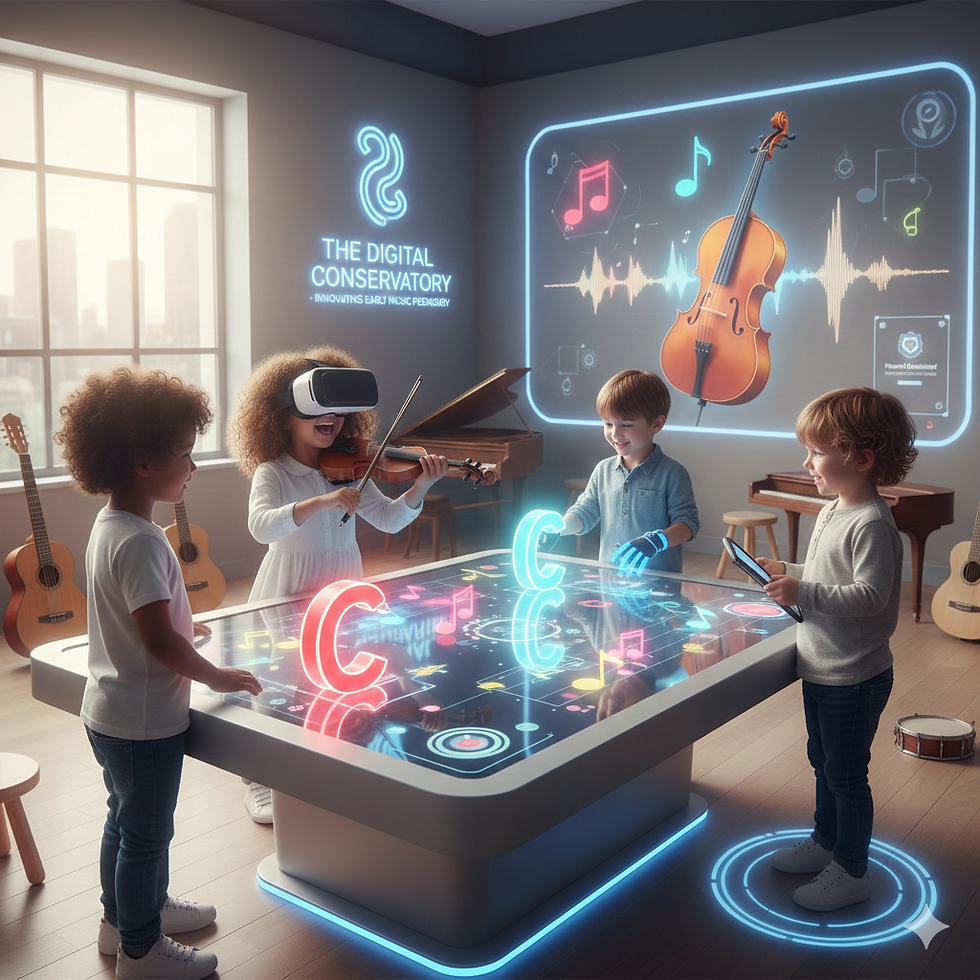"Level Up Your Ears: How Game-Based Learning Transforms Music Theory and Ear Training"
- Sep 25, 2024
- 3 min read
Updated: Oct 18, 2024
Introduction: The Role of Intervals in Music
Musical intervals are foundational to understanding music theory. As Garry Willis notes, when you listen to music, you're essentially listening to intervals. Recognizing these intervals is a skill that all musicians must master. However, interval training is closely tied to relative pitch, the ability to identify one note based on another note previously heard. This skill is critical in understanding the "distance" between notes, a concept central to musical intervals.
Ear training, which sharpens relative pitch, is considered by many educators to be even more crucial than performing, conducting, or instrument practice. Similar to how vision is a painter's most valuable asset, a well-developed ear is the musician's greatest tool. Yet, despite its importance, learning music theory and ear training can often be perceived as tedious and less engaging by students.
Game-Based Learning (GBL) as a Solution

To address the challenges of making music theory and ear training more engaging, Game-Based Learning (GBL) is proposed as an innovative method in this study. GBL has been widely recognized for its educational potential since the mid-1960s. In recent years, it has been applied to various fields like natural science, healthcare, computer science, and even foreign language education. From elementary school students to those in higher education, GBL has shown promising results in enhancing learning experiences.
When applied to music education, particularly for ear training, the right approach is essential to ensure that the game doesn’t merely present the material but enhances the student's learning journey. In this study, the researchers integrated an educational game with three sub-level stages designed to teach musical intervals and improve relative pitch.
Game Development and Structure
The game was developed using Adobe Flash Builder and programmed in ActionScript 3. It consists of five levels, each with three sub-level stages:
Learning Stage: A platformer-style game where the player must collect learning material to unlock barriers and move to the next stage. Each stage includes five pieces of learning content that come with titles, images, descriptions, and sound examples.
Theoretical Quiz Stage: After the player unlocks the barrier, they must answer theoretical questions based on the material learned in the previous stage. The player earns the correct answers to unlock the next stage.
Ear Training Stage: In this final stage, the player must identify musical intervals based on audio clues. The player chooses the correct interval, helping to solidify their ear training.
Research Design and Findings
The study was conducted in an elementary school in West Java, Indonesia, with 40 students aged 9-12 as participants. These students, both male and female, had basic computer skills, familiarity with video games, and healthy hearing.
The experiment involved both a pre-test and post-test to evaluate improvements in theoretical knowledge and relative pitch. The theoretical test comprised multiple-choice questions about the material presented in each stage. The relative pitch test involved listening to random intervals and identifying them by ear.
Results
The results of the experiment were significant. Students who played the game showed:
A 79.22% improvement in their theoretical test scores.
A 19.23% improvement in their relative pitch test scores.
Conclusion and Future Directions
The study demonstrates that integrating Game-Based Learning into music education can significantly improve students' theoretical knowledge and relative pitch. However, one of the primary challenges observed was the in-game instructions, as some students had difficulty during the quiz stages. Future work on the game could focus on improving these instructions and refining the gameplay to make it even more effective.
In summary, this study confirms that gamification can be an effective tool for making music learning more engaging and productive, especially in areas like interval recognition and ear training. As educators and developers continue to explore the potential of GBL, the future of music education promises to be both interactive and exciting.
WhatsApp - +91-8072415626 for 1:1 online classes.



Watching SmackDown streams tonight was ! Matches were insane and super entertaining,
The Null’s Brawl topic is explained clearly, highlighting gameplay features, characters, and updates in a neutral, informative way that helps readers understand the game without exaggeration or unsafe guidance. https://nullsbrawlls.org/it/
RLCraft crafting skills tutorial for beginners teaches essential crafting techniques, item combinations, and resource management. Learn how to create tools, weapons, armor, and potions efficiently to survive and thrive in RLCraft.
GB WhatsApp Premium” is a variant of GB WhatsApp (a third‑party mod of WhatsApp) that claims to offer extra / enhanced features beyond even the usual GB WhatsApp / GB WhatsApp Pro. It’s meant to provide more privacy, customization, media limits, and controls than the official WhatsApp.
Minecraft has always been more than just a game — it’s a sandbox for creativity, exploration, and learning. Over the years, the modding community has pushed boundaries by introducing new characters, mechanics, and interactive experiences. One example is the Minecraft Jenny Mod, a fan-made modification that showcases how game-based learning principles can be applied to engage players in unique ways. Click here for more guides, Minecraft Jenny Mod